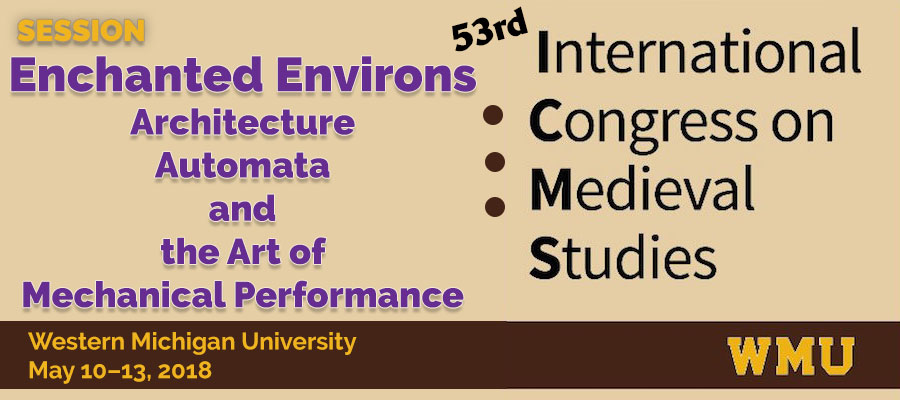Enchanted Environs: Architecture, Automata, and the Art of Mechanical Performance, 53rd International Congress on Medieval Studies, Western Michigan University, May 10–13, 2018
Medieval spaces were often sites of spectacular performances animated by various kinds of mechanical installations—the most complex of which featured automata or self-operating devices. Some items survive in material form; the most notable examples are the famous mechanical clocks of Central Europe. Other items survive in textual form; examples range from the singing birds in the palace of Caliph al-Muqtadir, the dancing monkeys in the garden of Count Robert II of Artois, and the bowing angel in the coronation pavilion of King Richard II of England to the Throne of Solomon of Middle Byzantine Constantinople, the ritual statues of late medieval Spain, and the liturgical set-pieces of late medieval Italy.
This session, enriched by the work of scholars such as Jean Gimpel and, more recently, Scott Lightsey and Elly Truitt, seeks to revisit the issue of mechanical installations as it relates to the history of the built environment—an area of academic research in which studies of human performance are many but studies of non-human performance are few. The working conceit of the session will be that of the Wunderkammer. Participants will deliver a series of shorter papers in order to facilitate a wide-ranging exploration of mechanical invention in the medieval world: Latin, Byzantine, and Islamic.
Possible topics of inquiry may include individual case studies, modes of production and/or reception, and larger questions of historical evidence (physical, textual, and visual) and/or historical significance (political, social, and economic). Especially desirable are contributions involving technical reconstructions (analog or digital), theoretical speculations (phenomenological or ontological), and, in keeping with the mission of AVISTA, investigations of famous polymaths such as Ismail al-Jazari, Villard d’Honnecourt, and Leonardo da Vinci.
Session organizers
Zachary Stewart, Texas A&M University
Amy Gillette, The Barnes Foundation
Sponsored by AVISTA (The Association Villard de Honnecourt for the Interdisciplinary Study of Technology, Science, and Art)
AVISTA is pleased to offer the annual, merit-based Villard de Honnecourt Award for the outstanding paper by a graduate student in an AVISTA session at the ICMS at Kalamazoo. It is based on evaluation of the candidate’s abstract and CV. This award, which comes with a $500 honorarium, is intended to further young talent in the study of medieval technology, science, and art. The Society is also pleased to offer up to two $500 grants-in-aid to graduate students or independent scholars to defray costs of attending the ICMS at Kalamazoo.
